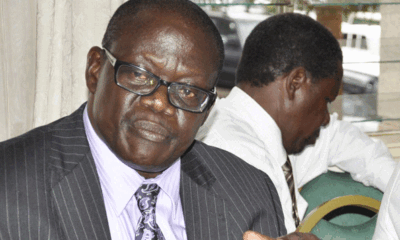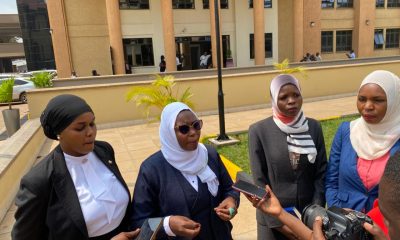Law
High Court Orders Government to Unveil Confidential ITMS Documents in Landmark Transparency Case
The High Court in Kampala has delivered a significant ruling, ordering the Ugandan Government to produce a range of critical documents related to the controversial Intelligent Transport Monitoring System (ITMS) project. The directive, issued by Civil Division Judge Boniface Wamala on Friday, follows a successful application by Legal Brains Trust, a prominent non-profit organization advocating for good governance and transparency.
The court has given the Government sixty days to present the memorandum of understanding and the main agreement signed with the Russian firm Joint Stock Company Global Security (also referred to as Global Systems LLC), the project’s financial model, the due diligence report, and the technical and financial assessment report. These documents were previously referenced in an affidavit by Haji Yunus Kakande, the Secretary in the Office of the President.
Legal Brains Trust, through their Executive Director, Senior Counsel Isaac Ssemakadde (represented by Advocate Stanley Okecho), had in 2021 filed Miscellaneous Cause No. 225 of 2021, seeking full disclosure of information and records pertaining to the ITMS project. The organization specifically sought not only the production of these documents but also permission for their lawyers to inspect and copy them.
Among the highly anticipated documents are those detailing the feasibility study for the ITMS project and the comprehensive agreement for the real-time digital monitoring and tracking system for all motor vehicles and motorcycles in Uganda. Legal Brains Trust also pressed for further particulars, including the project’s standard operating procedures, the structure of its oversight officers, and the checks and balances in place.
Furthermore, the organization demanded details regarding the alleged rise in crimes committed by motorcycle riders, which the Government cited as a primary justification for the system. They also requested records concerning President Yoweri Kaguta Museveni’s concerns that purportedly initiated the project, and comprehensive information about the technical committee involved in assessing the initiative, including its composition, mandate, activities, meeting minutes, budgets, and accountability mechanisms.
The application was supported by an affidavit from Lynette Akankwatsa, a lawyer and case officer with Legal Brains Trust, who asserted that the Government had failed to respond to prior requests for the documents. Akankwatsa emphasized the documents’ relevance to the case and their necessity for a fair and expeditious resolution, or even a potential out-of-court settlement.
In its defense, the Government, through Haji Yunus Kakande’s affidavit, had opposed the application, arguing that the requested documents were confidential and their disclosure would infringe on the privacy rights of foreign investors and potentially threaten national security. Kakande also contended that the Government had already responded to a similar request in August 2021 and that the current application amounted to a “fishing expedition.”
However, Justice Wamala, in his ruling, dismissed the claims of confidentiality and national security, stating that they could not be verified without examining the documents. He found no specific evidence presented to substantiate how the production of the documents would endanger the state or violate investor rights.
Quoting Order 10 Rule 14 and Rule 19(2) of the Civil Procedure Rules, Justice Wamala underscored the court’s power to order the production of documents for inspection, even when privilege or confidentiality is claimed, provided it is necessary for the fair disposal of the matter or to save costs. He clarified that the documents could be produced in a controlled and guarded manner, strictly for court use, with no unauthorized publication unless permitted by the court.
Justice Wamala ruled that the application had merit and allowed it in part, ordering the Government to produce the documents for court inspection within sixty days. He stipulated that the production is solely for court use, and neither party may publish or disclose the contents without specific court permission after confidentiality or privilege claims have been determined. The costs of the application will be decided as part of the main proceedings.
Reacting to the decision, Stanley Okecho, counsel for Legal Brains Trust, hailed the ruling as a “positive step,” emphasizing that “The Court is upholding transparency as a tenet for a functioning democracy. We expect them to appeal, we are ready to sweep out secrecy in matters touching the public purse.”
From forced exile, Senior Counsel Isaac Ssemakadde expressed immense gratitude, stating, “What marvellous news after an epic 4-year battle over these documents! What a lifeline for the Rule of Law! I am so grateful to my Lawyers for this Milestone in anti-corruption Advocacy.”
The ITMS project, first announced in 2021, aims to digitally track and monitor all vehicles and motorcycles in Uganda in real-time. The Government cited rising urban crime and the need for improved traffic and security management, particularly following the unresolved murders of high-profile officials, as the rationale for its implementation.
In June 2021, the Minister in charge of Security, Major General Jim Muhwezi, announced that Cabinet had approved the initiative, which involves fitting all vehicles and motorcycles with electronic number plates containing signalers, with the cost to be borne by vehicle owners. This 10-year project is slated to be managed by Global Systems LLC, with the company initially taking a 70% share of penalties in the first two years, gradually shifting to a 30% share from the sixth year onwards.
This ruling also comes after a previous attempt in 2021 by lawyer Male Mabirizi to obtain similar documents was denied, leading to a successful lawsuit where he was awarded UGX 5 million for the violation of his right to access information by the Permanent Secretary of the Ministry of Works and Transport.
The High Court’s decision marks a pivotal moment in the ongoing quest for transparency and accountability in Uganda’s public procurement processes, particularly concerning large-scale, technologically driven government projects.
Comments

























